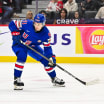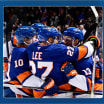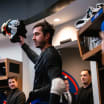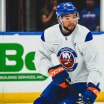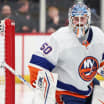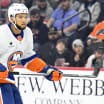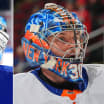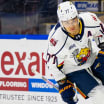One of the interesting things about this journalism business is that sometimes I get an idea in my head that nobody else seems to have.
Then, upon further review, I either question my sanity or my sagacity, depending on the subject at hand.
I bring up this point now because I've been asked to write a piece about a former Islanders defenseman named Gord Lane.
Maven's Memories: Gord Lane, Tougher Than Tough
Stan Fischler profiles dependable defenseman Gord Lane
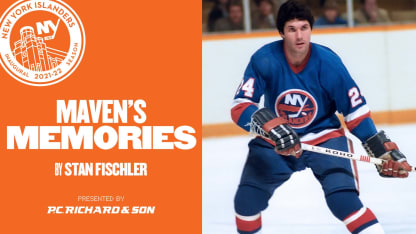
By
Stan Fischler
Special to NHL.com
Gord Lane? Are you wondering as well as I've been wondering about this almost forgotten warrior; one of the most dauntless in memory?
Well, let me tell you something about Gord Lane:
For one thing, I'd want the Brandon, Manitoba native on any team that I'd own.
And for another, any meticulous check of the Islanders archives would reveal how valuable this unobtrusive fellow was to a triumphant franchise.
Ever since the Dynasty Years spanning the Islanders 19 consecutive playoff series victories (1980-1984), I've been asked by many to explain the success sculpted by General Manager Bill Torrey that led to the series skein.
The obvious answer was "The Butch Goring Deal." Still could be.
MAVEN'S MEMORIES
WRITTEN COVERAGE
Don't Forget Tomas Jonsson
The Underrated Stefan Persson
Stan's Favorite Clark Gillies Memories
From Doghouse to Penthouse in 1975
Al Arbour's Trifecta
Giving Away the Banks of Gifts -- Almost
Ken Morrow's Moments
First Isles-Rangers Game
Maven's Haven
Bow Tie Bill and his faithful sidekick, Chief Scout Jim Devellano, had known through the late 1970's that the Islanders had become too dependent on center Bryan Trottier to carry the club's offense.
"There was no doubt that Trots could do the job," Torrey explained, "but having only Bryan as our top center meant that the opposition could put so much more pressure on him and that could do us in -- which it did."
The 1979 result was Torrey trading right wing Billy Harris and defenseman Dave Lewis to the Los Angeles Kings for Goring.
There are some historians who rate that exchange "The Greatest Hockey Trade Ever Made" and one could make an argument for that. After all, once Goring jetted East and joined the Nassaumen, the franchise took on a new, invigorated, win-all look.
Also, Nassau Veterans' Memorial Coliseum took on an appropriate nickname -- Fort Neverlose.
As hoped, Goring became exactly what the high command had hoped for -- and then some. Butch not only became the ideal second line center but also was invaluable as a penalty-killer and power-play specialist.
"No question," Devellano concluded, "Butchie put us over the top."
Except.
Except there were two other individuals -- call them the "other final pieces" to the puzzle -- involved who were vital in placing the Islanders on the Stanley Cup Express Track.
Much has been written about defenseman Ken Morrow hedgehopping from the 1980 United States Olympic team's "Miracle On Ice" Gold Medal victory in Lake Placid to the Islanders.
"The acquisition of Morrow," said Torrey, "meant I had an extra defenseman. Knowing that, I was able to include Dave Lewis -- along with Billy Harris -- in the package for Butch."
All true; but what about the Third Man?
That's where I enter the picture along with defenseman Gord Lane.
A native of Brandon, Manitoba, Lane had made it through the Junior hockey ranks and up into the minors before attracting the attention of Washington Capitals scouts. The D.C. bird dogs liked enough of what they saw to recommend Gord to the big club.
According to most accounts, Lane played commendably for the Caps. He hit hard and sometimes harder. He understood the game and seemed to be a fixture in Washington. Or so he thought.
For reasons I never could discern, Lane began getting less and less ice time and soon felt that he was not wanted or, to put it another way, that the general staff failed to appreciate his talents. Whatever the case, Gord made clear his displeasure.
A trade was imperative and Torrey relieved the Caps of their "burden" and, in return, the Islanders dispatched forward Mike Kaszycki to the Capitals.
The deal caused hardly a ripple in the NHL seas. Certainly, it went through without any fuss or fanfare on Hempstead Turnpike or other parts of Nassau and Suffolk counties. The best word that described Lane's arrival on the roster was unobtrusive.
That, however, soon would change.
"Gord brought something special to the defense," explained Glenn (Chico) Resch who was alternating in the Isles goal with Bill Smith. "He was feisty -- sometimes nasty -- and he was one of those precious few players who put fear in the opposition. Gord intimidated them."
Except for the important locker room core, Lane's early impression could not be rated overwhelmingly positive. More like just okay.
But then Morrow moved in and when Harris and Lewis went bye-bye, coach Al Arbour had a blended defense. From Denis Potvin to Stefan Persson to Morrow there was a solid core but none of the trio carried the instinctively nasty streak that was part of Lane's DNA.
This was evident in his first game with the Nassaumen. Skating against the Rangers, Gord flatted enough Blueshirts to flatter his new coach Al Arbour. "I liked Gordie from the start," said Radar. "In some ways Lane reminded me of me; that careful defensive style I played."
But, having seen both Radar and Lane in their respective primes, Arbour never had that extra bit of growl that was part of Gord's game. Lane's nickname could have been Banzai.
"The thing with Gord," said one veteran reporter, "was that when an opponent came down his side of the ice, you never knew what to expect. And it could be something that hurt."
From what began as an iffy trade evolved into another Torrey gem. Lane not only fit into the top four blueliners blueprint, but his effectiveness ran through the whole team. On the other hand, Kaszycki never became that much of an NHL factor. Another Bow Tie bonanza.
"What we got," added Devellano, "was more than just toughness. Lane had been around before we ever got him. He knew the league and he adapted well to Al's (Arbour's) system.
The proof is that he played on every one of the Islanders four Cup-winning teams."
It might have been five-straight for the Nassaumen in 1984 except for Lane's pre-Final injury. Unfortunately, Lane came up lame and missed the fourth round against Edmonton. In this case, having the Isles toughest D-man in the lineup was essential for victory.
As I reflect on the 1984 Islanders-Oilers collision, I can single out one short episode that turned the series away from the Islanders -- then still dominating -- to the other side.
With the series tied at one win apiece -- and Game Two knotted up -- Mark Messier thundered down the left side which normally would have been guarded by Lane. Instead, rookie Gord Dineen had replaced Lane.
As Messier sped one-on-one against Dineen it was glaringly apparent that the freshman wasn't up to stopping the Oilers sharpshooter. Had it been Lane it would have been a different story; perhaps with Mess messed up on the ice.
On that critical rush, Mark Messier flew past Dineen as if the youthful defender was a telephone pole. Mark then went head-to-head with Bill Smith and beat the Isles netminder. The Islanders never were the same team after that gaffe.
"Gord's presence was sorely missed," according to one report of the Final Round won by Edmonton in five games. And it was fini for Team Dynasty; but not Gord Lane.
Having played on all four Cup winners, he was deemed strong enough to remain with the big team after The Drive for Five. As for Torrey and Devellano, they could look backward to that trade that dispatched Mike Kaszycki to Washington for Gord Lane.
"It may not have looked big at the time," Torrey concluded, "but it sure was in the long run."
That may have appeared to be a subjective observation, but it spoke the truth. A scout not connected to the Islanders reinforced Torrey's claim:
"Lane was an underrated enforcer who never failed to come to the aid of a teammate in trouble. Gord has been credited over the years with being the Islanders most effective defender during their Cup runs."
Now you know why The Maven was anxiously awaiting the call to write about a previously unsung hero now having an aria warbled about him.
And, at the expense of being redundant, allow me, if you will, just four more words about one of my forgotten favorites:
Good job, Gord Lane!

